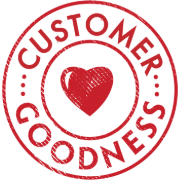Social Impact
Carmién Tea’s story started in 1998 in an old farm shop on the historic Brakfontein Estate near the small town of Citrusdal. Located in the foothills of the Western Cape’s splendid Cederberg Mountains, the farm falls within the Greater Cederberg Biodiversity Corridor.
The founder and now managing director, Mientjie Mouton, grew up on a rooibos-producing farm just a little higher up in the same valley before moving to Brakfontein Estate, where rooibos was also produced. She saw great potential in the product rooibos; today, the Carmién brand tells this story.
Growing Goodness
The Carmién tagline 'Growing Goodness' refers to the commitment to deliver products of the highest quality and exceed our clients' expectations across the globe. The entire process from growing the product in the fields to developing the best flavour and aroma is controlled by strict processes and measures. To keep a consistent quality and best flavour we adhere to the following certifications and get audited by all these certification bodies regularly.

Customer
Goodness
Carmién is committed to putting our customers at the heart of everything we do.

Flavour
Goodness
Carmién is committed to quality products, freshness and exceptional taste.

Social
Goodness
Carmién is committed to the well-being of its workforce and local communities.

Eco
Goodness
Carmién is committed to keeping its farms and work methods earth-friendly and safe.
Sustainability and Environmental Initiatives

Protecting Nature
- > 50% of farm hectares are set aside as pristine undisturbed areas, protecting the habitat of pollinators and native wildlife.
- Minimising the use of chemicals in production.
- Prohibiting hunting and wildflower picking.
- Creating corridors across the landscape.
- Raising awareness among workers.
Measuring and Mitigating our Carbon Footprint
- Cutting carbon emissions with solar technology and cutting on fuel
- Farm footprint = 0.55 kg CO2 per kg wet tea produced
- Processing and packing footprint = 0.90KG Co2 per kg dry tea processed


Going Green
- Our pyramid teabags are crafted from PLA compostable material, derived from renewable resources such as cornstarch, sugarcane, and cassava. This innovative material is non-toxic and biodegradable and designed to reduce environmental impact while maintaining premium quality and flavour infusion.
- Our Cold Brew teabags are made with Bioweb, a sustainable, non-plastic filter paper that ensures an eco-friendly and refreshing tea experience.
- All our pillow teabags are made with Fibre+, a non-plastic filter paper that offers a sustainable alternative without compromising on quality.
- All recyclable outer packaging is FSC (Forest Stewardship Council) certified. This means that for every tree used to provide paper, a new one will be planted.
- Printing inks comply with environmental protection and consist of materials derived from renewable raw materials.
- Glues used are non-toxic, non-flammable (wet state) and suitable for indirect food contact.
Green Energy Initiatives
- Rooibos tea is dried under the natural African sun, utilizing free and abundant solar energy, making the production process inherently energy-efficient.
- Significant investment in solar power and energy storage systems to maximize sunlight utilization. The first phase began in 2015, with expansions in 2023 and 2024, and the next phase is currently underway. This ongoing project aims to further enhance the use of natural resources.
- Power supply challenges in South Africa require us to generate our electricity. Actions taken to improve diesel generator efficiency include:
- Installation of a Power Factor and synchronizing system to reduce diesel consumption.
- Timers on generators to prevent unnecessary energy consumption during nighttime.
- Solar geysers installed at all worker housing units.
- Solar installations at pump stations to ensure efficient energy use.
- Use of skylights to minimize the need for artificial lighting.
- Investment in fuel-efficient, low-emission vehicles to reduce the carbon footprint of transport operations.


Water Conservation
- All wastewater is collected in a dam and reused for irrigation, ensuring zero water wastage.
- Minimum tillage of soil to preserve soil moisture and structure.
- Focus on dryland crops such as Rooibos tea and vineyards, reducing dependency on artificial irrigation. Rooibos tea is non-irrigated and relies solely on groundwater and rainfall.
Waste Reduction and Recycling
- Bulk tea packaging: Transition from 3-ply to 2-ply craft paper bulk bags, reducing material usage while maintaining product integrity.
- Recycling initiatives include the use of 100% recycled material for inner and outer Rooibos tea cartons.
- All filter paper used for Rooibos tea bags is fully compostable and made from cornstarch or sugarcane fiber, countering microplastics.
- Rooibos tea waste is repurposed as mulch for gardens, ensuring no organic material is wasted.
- Use of peach pits (the only waste from fruit drying) for paving to reduce dust and erosion.
- Coordination of combination loads for transport between different departments and companies within the group, maximizing efficiency and reducing emissions.
- Implementation of the Noda-tech diesel app to optimize and track fuel efficiency and route planning.


Biodiversity and Environmental Conservation
- 50% of Bergendal farm remains wild, forming part of the Fynbos Floral Kingdom of South Africa.
- Spekboom planting for carbon sequestration, widely used in landscaping and distributed as gifts to tourists at De Tol Deli.
- Integrated Environmental Management Plan to guide sustainable farming and operational practices.
- Beekeeping initiatives to promote pollination and biodiversity.
Quality Control
At Carmién Tea we have an internally qualified, experienced quality and product development team. This allows us to stay ahead of competition when it comes to innovation. We have by far the largest selection of rooibos tea products offering our clients a variety of products with specific health and functional benefits for every stage of their lives. Not only do we aim to offer clients more than a cup of tea, but a unique rooibos experience to support a healthy lifestyle!
Social Impact in Numbers
Education and Youth Care
Early Childhood Development Centres
After School Centres
Early Childhood Development Centre Classrooms
After School Centre Classrooms
Children in ECD
Children in After School Centres
Tertiary Bursary Students
Sponsored School Fees
Community Development
Counselling Cases with Social Workers
Employees in Housing Facilities
Driving Lessons and Licenses
Community Centres
Education Centres
Clinic Building
Mobile Clinic
Busses
Events held at Community Centres
Trips with Foundation Busses
Health Care and Facilities
Clinic Visits
Chronic patients
Chronic patient monitoring visits
Eyecare Treatments
General voluntary health checks and screening visits
Staff and Beneficiaries
Total beneficiaries
Foundation staff members
Social workers
Health workers
Music teacher
Township Community Development

Action for Community Transformation (ACT)
ACT is a community-based organisation that supports farm communities through social services, food provision, and developmental programmes. They run a daily community kitchen, partner with local businesses, and provide ongoing support through social workers. While rooted in care and welfare, ACT is actively shifting focus back to long-term community transformation, aiming to create sustainable change rather than only responding to immediate needs.



Social Commitment
Since 2001, Carmién Tea is also a vehicle of empowerment aiming to provide sustainable jobs and broad-based wealth creation for its farmworkers as an independent marketing company. Strategic partnerships with like-minded commercial and Fairtrade producers, e.g., Bergendal Farming Operations, led to the foundation of Bergendal Rooibos in 2006. Bergendal Rooibos is the exclusive Rooibos drying, pasteurising and packing facility for Carmién Tea.
Our partnerships with Bergendal Worker Trust as well as with the Mouton Workers Trust, Mgro ensure that 813 workers with about 5,000 dependents have a shareholding in any Carmién Tea product. Carmién Tea actively supports community development on shareholders’ farms and is also committed to women- and childcare in the broader community through its partnership with Ubuntu Citrusdal.
Shareholders and Social Partners
Mouton Foundation
Bergendal Rooibos
Emgrow Mouton Citrus
Social Responsibility and Job Creation
Carmién is fully committed to integrating sustainable practices into every aspect of our operations. Through strategic investments in green energy, water conservation, waste reduction, and biodiversity protection, we continue to lead the way in responsible business practices. By working together, we can make a lasting impact on the environment and our communities.